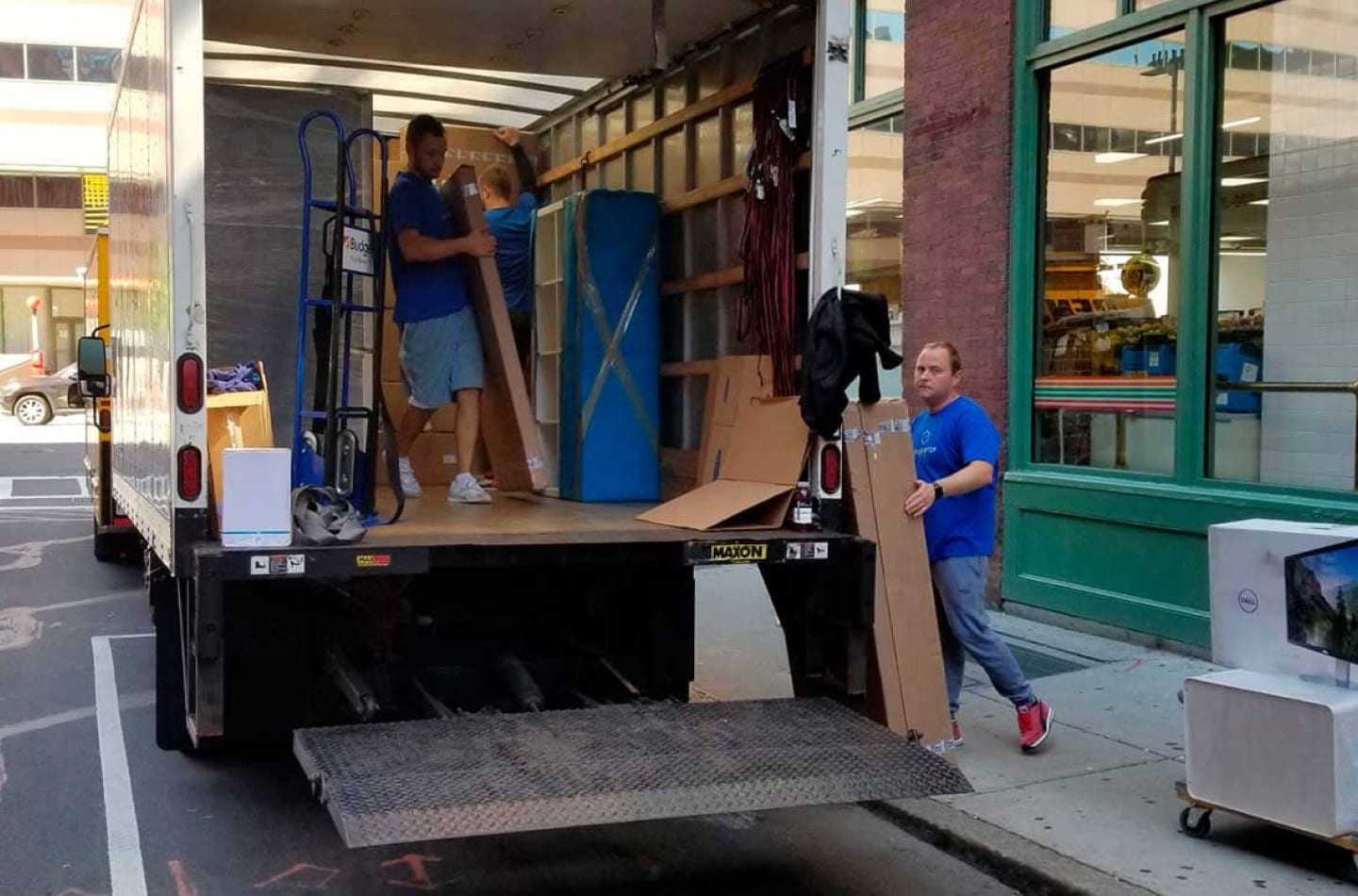The terms and conditions that are outlined below apply to any and all services that are carried out in accordance with this agreement by the Carrier. The company StepByStepMoving is considered to be the “carrier” in this scenario. In addition, the contract is bound by any and all restrictions, fees, and taxes that are outlined in the current tariffs that are issued or kept up to date by the Department of Public Utilities of the Commonwealth of Boston.
SEC. 1
(a) The Carrier or any person in possession of any of the Property indicated above (collectively referred to as “Property”) shall be liable under common law for any loss or damage to any of the above-mentioned Property, with the exception of what is specifically listed above. This liability applies to all of the Property listed above, except for what is specifically listed above.
(b) No Carrier or party in possession of all or a portion of the Property (“Carrier”) shall be liable for any loss, damage, or delay caused by an act of God, public enemy, declared or undeclared war, acts of public authority, quarantine, riots, strikes, perils of navigation, the act of fault of Shipper or Owner, nature of Property or defect or inherent vice, occurrences in a customs warehouse, or for any loss or damage to paintings, statues, or ornamental items. No shipping company will be held responsible for the internal malfunction of any electronic, electrical, or mechanical device or piece of equipment, regardless of who packed the item, unloaded the item, or packed and unpacked the item. This applies even if the item was packed and unpacked by the same person. This guideline is applicable whether the products are being packed and unpacked by the Shipper, the Shipper’s agency, or the agent working for the Carrier. No Carrier shall be liable for damage to or loss of contents of pieces of furniture, crates, bundles, cartons, boxes, barrels, or other containers unless such contents are opened for the Carrier’s inspection, and even then, only for those articles listed by the Shipper and receipted for by the Carrier’s agent. This is because no Carrier shall be liable for damage to or loss of contents of pieces of furniture, crates, bundles, cartons, boxes, barrels, or Items that are specifically indicated by the Shipper are exempt from this requirement, as are open barrels or other containers that are subject to inspection by the Carrier.
(c) No Motor Carrier shall be held accountable for any delay caused by blockages, defective or inaccessible roadways, lack of capacity of any highway, bridge, or ferry, or breakdown or mechanical defect of vehicles or equipment. This provision applies to all modes of transportation.
- d) The responsibility of the Carrier is limited to that of a warehouseman only for any loss, damage, or delay caused by fire after the Property has arrived at its destination or at the port of export and after the transfer of the Property to the person who is entitled to receive it. This restriction only applies after the Property has been transferred to the person who is legally obligated to receive it. This paragraph is applicable in any circumstance, regardless of whether the fire occurred at the port of export or after the Property had already arrived at its final destination. Whether the request was made before or after the Carrier took possession of the Property, the Carrier is not responsible for any loss, damage, or delay that occurs while the Property is stopped, held, or stored in transit at the request of the Shipper, Owner, or party entitled to make such a request. This holds true regardless of when the request was made in relation to the Property. This is true notwithstanding the fact that Carrier may or may not have acted negligently.
SECTION 2, PARAGRAPHS
- a) The Carrier shall have the right to transport the Property through any other Carrier or route if it is practically necessary for the Carrier to do so between the location of shipment and the point of destination. This provision only applies if it is the Carrier’s responsibility to do so. If a lower value than the actual value has been represented in writing by the Shipper, or if a lower value than the actual value has been agreed upon in writing as the released value of the Property as determined by the classification or tariffs upon which the rate is based, then such lower value less charges shall be the maximum amount that can be recovered, regardless of whether the loss or damage was caused by negligence. If a lower value than the actual value has been agreed upon as the released value of the Property as determined by the classification or This is true in each and every scenario in which engaging in such behavior is not expressly prohibited by the law.
(b) Claims must be filed in writing with the receiving or delivering Carrier, or Carrier issuing this proposal for service and bill of lading, or the Carrier in possession of the Property when the loss, damage, injury, or delay occurred, within 10 days after delivery of the Property and suits shall be instituted against any Carrier only within two years and on the day from the day when written notice is provided by the Carrier to the claimant. Claims must be filed with the receiving or delivering Carrier within This condition necessary for someone to be able to recuperate. In the event that claims are not submitted, or lawsuits are not initiated in accordance with the conditions outlined above, none of the insurance providers listed above will be held accountable for any damages that may be incurred.
(c) Any Carrier or person accountable for the loss or damage to any of the Property will have the full benefit of any insurance that may have been effected upon or in respect to the Property, provided that the Carrier reimburses the claimant for the premium paid thereon. This provision applies to any insurance that may have been effected upon or in respect to the Property. In the event that the insurance policies or contracts are invalidated, the full benefit of any insurance that may have been put into force on or for the Property will not be impacted in any way. This includes any coverage that may have been paid out.
The expenses associated with any necessary cooperage, packing, or repacking of the Property are the Owner’s responsibility unless such services are needed due to the fault of the Carrier. In that case, the Owner is responsible for the fees associated with such services.
SECTION, 4
(a) The Carrier shall have the right to retain ownership of any Property carried by it and to store the same at the expense and cost of the Shipper until all applicable tariff rates and charges have been paid in cash or by credit card. This provision shall remain in effect until all applicable tariff rates and charges have been paid in cash or by credit card. This condition will remain in effect until the whole amount of cash or credit card payment for all relevant tariff rates and levies has been received. There is nothing in this agreement that should be interpreted as limiting the right of the Carrier to request, either at the time of shipment or before shipment, the prepayment of some or all of the costs or a guarantee thereof. This right is not limited in any way by this agreement.
(b) Property not received by the party entitled to receive it after proper notice may be kept in the vehicle, warehouse, or place of business of the Carrier, subject to all lawful charges and to the Carrier’s responsibility as warehouseman only, or at the option of the Carrier, the Property may be removed to and stored in a warehouse at the point of delivery or other available points at the cost of the Owner, and there held without liability on the part of the Carrier.
- c) Property not received by the party entitled In the event that the Consignee cannot be identified at the location listed on the bill of lading for notification, the Carrier is released from obligation by providing notice to the Shipper identifying the warehouse where the Property has been deposited, subject to the conditions outlined in this paragraph. In the event that the Consignee cannot be identified at the location listed on the bill of lading for notification, the Carrier is released from the obligation. In the event that the Consignee cannot be located at the location that is specified on the bill of lading for notice, the Carrier is absolved of all responsibility. Taking into account that the Consigne prove otherwise.
SECTION, 5
(a) If the Carrier is required to retrieve the Property from a place or places where neither the Consignor nor his agent is present, then the Owner is responsible for any risks that are associated with the Property prior to it being loaded into the Carrier’s vehicle.
(b) If the Consignee or its agent is not present when the Carrier is directed to unload or deliver the Property at a location or locations, the Owner assumes the risk of loss for the Property after it has been Unloaded or Delivered. This applies even if the Consignee has given the Carrier specific instructions regarding the location(s) where the Property should be unloaded or delivered.
SECTION, 6
No Carrier shall carry or be accountable in any manner for any papers, currency, or goods of exceptional value absent a formal agreement to do so and a predetermined value of the articles. This provision applies even if the value of the papers, currency, or goods has been previously determined. This includes any documents that are associated with a monetary transaction or a transaction involving a document that involves money.
SECTION, 7
Transporting explosives and other things that might be hazardous to human safety is illegal. Carrier shall not be responsible for ensuring that the cargo is delivered in a secure manner, and every person responsible for shipping such things, whether acting as principal or agent, will indemnify Carrier against any loss or damage caused by such items. Carrier shall not be liable for such losses or damages.
SECTION, 8
The Owner or the Consignee is responsible for paying any advances, tariff charges, shipping and storage costs, and any and all other reasonable expenditures that arise on the item that is the subject of this dispute. There is no way for the Property to be delivered or possession of it to be transferred at its final destination if any and all applicable tariffs and taxes have not been paid in full by the Carrier. The Consignor is responsible for any advances, tariff charges, packing, storage, and other shipment-related expenses that are legal unless an alternate agreement has been established in writing that specifies a different arrangement. The Beneficial Owner is accountable for any charges that are owed to the Carrier, regardless of who the Consignor or the Consignee was when those costs were paid. If the Consignor or the Consignee gave inaccurate information to the Carrier about the identity of the beneficial Owner, then the Consignor or the Consignee will be responsible for any additional expenses and attorney’s fees paid by the Carrier as a consequence of this revelation. In addition, the Consignor or the Consignee will be held liable for any penalties that may be imposed by the Carrier as a result of this revelation. In addition, the Consignor or the Consignee is accountable for any additional expenses that may have been incurred by the Carrier as a direct result of this discovery. This agreement should not be interpreted as reducing the Carrier’s right to request full payments of all costs prior to the dispatch of goods. This would be a mistake. If it can be shown via inspection that the commodities being transported are not those stated in this document, the advances or tariff fees will need to be paid on the products that were actually sent.
SECTION 9
The Shipper’s signature on the prior proposal for service and bill of lading as to the statement of the value or otherwise or election for common law or bill of lading liability in or in connection with such prior proposal for service and bill of lading shall be canceled if this proposal for service and bill of lading is issued on the order of the Shipper or his agent in exchange or substitution for another proposal for service and bill of lading. This section applies only if this proposal for service
SECTION 10
Any alteration that is made to this proposal for service and bill of lading without the explicit notification of the Carrier will be null and void, and this document must be enforced in accordance with the provisions that it had when it was first created. This provision will go into effect as soon as possible.


